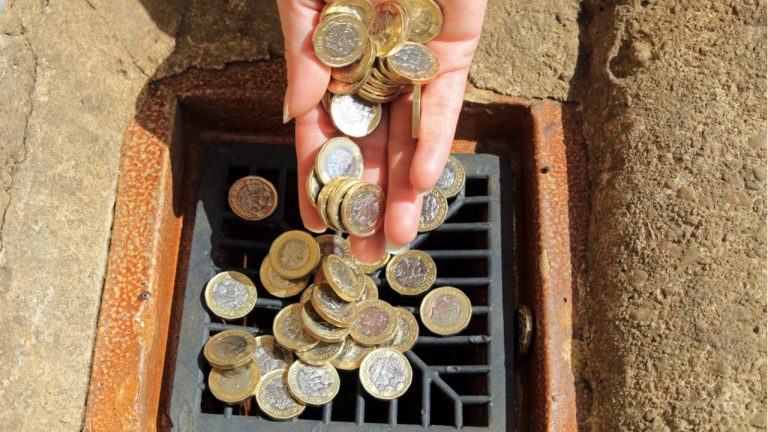
A trio of privacy-focused altcoins are seeing dips in price after a prominent crypto exchange platform said it is going to delist them. In a new company blog post, the Seychelles-based crypto exchange OKX says that it’s going to delist Monero (XMR), Zcash (ZEC), and Dash (DASH) as they no longer fit the firm’s listing […]
The post Privacy-Focused Altcoins Suffer Price Drops After Crypto Exchange OKX Says It Will Delist Monero, Zcash and Dash appeared first on The Daily Hodl.

Brian Armstrong claimed SEC staff said all cryptocurrencies but Bitcoin are securities and requested the exchange delist all other cryptocurrencies.
Crypto exchange Coinbase was once told by the United State securities regulator to delist all cryptocurrencies on its platform except for Bitcoin (BTC), according to CEO Brian Armstrong.
In a July 31 interview with the Financial Times, Armstrong revealed that the U.S. Securities and Exchange Commission wanted the exchange to delist the nearly 250 tokens on its platform prior to it filing a lawsuit against the exchange.
At the time, the SEC reportedly said it believes “every asset other than Bitcoin is a security,” said Armstrong.
“We said, well how are you coming to that conclusion? Because that’s not our interpretation of the law,” Armstrong added.
He recounted that the regulator said, “we’re not going to explain it to you; you need to delist every asset other than Bitcoin.”
It’s a similar view held by SEC Chair Gary Gensler, who claimed in a February New York Magazine interview that “everything other than Bitcoin” is a security under the agency’s remit.
There's nothing about the crypto securities markets that suggests that investors & issuers are less deserving of the protections of our securities laws.
— Gary Gensler (@GaryGensler) June 12, 2023
Congress could have said in the 1930s that the securities laws applied only to stocks & bonds.
For more, read my remarks:
Armstrong saidthat agreeing to the SEC’s request could’ve set a precedent and “would have essentially meant the end of the crypto industry” in the United States.
“It kind of made it an easy choice [...] Let’s go to court and find out what the court says.”
The SEC sued Coinbase in early June, alleging it operated as an unregistered exchange and named 13 cryptocurrencies it said Coinbase offered as unregistered securities. Days earlier, the regulator filed a similar complaint against Binance.
Related: Pro-XRP lawyer claims SEC prioritizes corporate capitalism over investors
The SEC told the Financial Times its enforcement division does not make formal requests for “companies to delist crypto assets” but that its staff may share its view on what actions could violate securities laws.
Crypto industry oversight in the U.S. hasn’t landed on any one regulator, and the Commodity Futures Trading Commission and the SEC have both taken regulatory action against crypto industry players.
Legislation that would mostly hand crypto jurisdiction to the CFTC and clarify the SEC’s crypto-related role passed the House Agricultural Committee on July 27 after its earlier passage through the House Financial Services Committee.
Collect this article as an NFT to preserve this moment in history and show your support for independent journalism in the crypto space.
Magazine: Crypto regulation — Does SEC Chair Gary Gensler have the final say?
 Cryptocurrency exchange Coinbase announced it will suspend trading and delist the Paxos-managed stablecoin asset BUSD. The decision follows Paxos’ revelation that the New York State Department of Financial Services directed the firm to stop issuing the U.S. dollar-pegged token BUSD. Coinbase to Suspend BUSD Stablecoin on March 13 On Feb. 27, 2023, Coinbase announced that […]
Cryptocurrency exchange Coinbase announced it will suspend trading and delist the Paxos-managed stablecoin asset BUSD. The decision follows Paxos’ revelation that the New York State Department of Financial Services directed the firm to stop issuing the U.S. dollar-pegged token BUSD. Coinbase to Suspend BUSD Stablecoin on March 13 On Feb. 27, 2023, Coinbase announced that […]
The exchange cited its own token management policy and compliance efforts as primary reasons for delisting seven privacy coins.
Cryptocurrency exchange Huobi will delist seven different privacy coins from its platform as regulatory pressure mounts on anonymity-enhanced currencies (AECs).
The exchange announced that it had terminated the trading service of a number of privacy tokens including Dash (DSH), Decred (DCR), Firo (FIRO), Monero (XMR), Verge (XVG), Zcash (ZEC) and Horizen (ZEN).
These tokens will begin to be delisted on Sep. 19, while deposit services were ceased on Sep. 12 in correspondence with the announcement. Users were urged to cancel open orders for the privacy coins, while the exchange will cancel any existing orders at the delisting time and credit users spot accounts.
Related: US expansion for Huobi a step closer after it secures a FinCEN license
Huobi noted that it made efforts to meet compliance policies of more than 100 countries in which its services are available. The announcement cited efforts to comply with the latest financial regulations, as well as the company’s Token Management Rules.
Article 17(16) of its rules list addresses ‘trading concealment or suspension’, which gives Huobi Global the right to conceal or suspend token trading in the following circumstances. Clause 16 is directed at privacy coins in particular:
“The token is a privacy token, does not support offline signatures, or its node source codes are not open-sourced.”
The exchange also confirmed that it had ended trading services on its futures, margin, ETP, OTC and trading bot services. Cointelegraph has reached out to Huobi Global to ascertain the driving force behind the move and whether regulators in specific countries have necessitated the delisting of the respective privacy coins.
As Cointelegraph previously reported, privacy tokens have come under intense scrutiny in different jurisdictions around the world, with the likes of Japanese, South Korean and Australian regulators outlawing their use in recent years.
Huobi is eyeing a move into the United States market after acquiring a Money Services Business (MSB) license from the US Financial Crimes Enforcement Network (FinCEN) in July 2022.

The moved surprised some users as ADA has not been typically on regulators' radars as of late.
In a statement released to customers on Tuesday, Israeli cryptocurrency exchange eToro announced it would delist Cardano (ADA) and Tron (TRX) for United States customers by the end of the year.
After Dec. 31, U.S. users will no longer be able to open new positions in the tokens nor stake ADA and TRX. In addition, wallets will be effectively in withdraw-only mode until the first quarter of 2022, when selling will also become limited. In making the decision, eToro cited regulatory concerns surrounding both assets.
The move came as a surprise to some as ADA has not been traditionally associated with regulatory troubles. In context, tokens like Ripple (XRP), whose creators are currently engaged in an ongoing lawsuit with the Securities and Exchange Commission, or SEC, as well as Monero, which is a privacy coin that some fear is easily abused for illicit purposes, are facing the brunt of regulatory scrutiny in the cryptocurrency industry.
ADA experienced a rapid price increase this year and currently ranks among the top 10 cryptocurrencies by market capitalization. During the prior quarter, Charles Hoskinson, Cardano's founder, announced a partnership with blockchain analytics provider Confirm to comply with regulatory frameworks, such as anti-money laundering directives. The move was panned by some ADA supporters, who wanted the project to take on a more decentralized nature.
Firms operating in the blockchain industry often receive intense pressure from regulators when it comes to delisting coins or pulling the plug on certain services. In Sept., Coinbase abandoned its crypto lending platform plans after the SEC threatened to sue the company. For now, however, the rise of decentralized exchanges and decentralized finance protocols have provided popular alternatives for those looking to legally bypass such crackdowns.

Although privacy coins grant users unparalleled protection for their personal information, some fear they can easily be used for illicit purposes.
In an email quoted by Reddit users, Kraken, the world's eighth-largest cryptocurrency exchange by trading volume, announced it would be delisting privacy coin Monero (XMR) in compliance with regulations in the United Kingdom. The platform will cease all XMR trading activities, set XMR wallets to withdraw-only, and force-liquidate any existing XMR margin positions after Nov. 26.
Through advanced cryptography, privacy coins like Monero obscure participants' public wallet addresses and payment amounts when their transactions appear on the blockchain, making it improbable, in the context of current technology, for forensic entities such as Chainalytics to digitally trace the identities of the transacting parties.
The development of privacy coins such as XMR has been a controversial topic. Supporters claim that they provide users with greater personal privacy than cryptos with universally-viewable ledgers like Bitcoin (BTC), knowing that individuals' public wallet addresses and transactions can't be cross-compared with know-your-customer information stored on exchanges to pierce the shroud of their identity. However, critics say that the untraceable nature of privacy coins makes their adoption ideal by criminals, such as for use in drug trafficking, tax evasion or money laundering operations.
As a result, privacy coins face scrutiny from cryptocurrency exchanges across the world. Last year, Coinbase refused to list XMR, citing regulatory concerns. Earlier in January, Bittrex delisted XMR, as well as leading privacy coins Zcash (ZEC) and Dash. Riccardo Spagni, the former maintainer of XMR, was arrested in the United States in July at the request of the South African government on alleged fraud offenses in that country between 2009 to 2011. He has since been released from custody, but court proceedings are ongoing.
Despite the growing backlash from centralized financial institutions and administrative bodies against privacy coins, they have continued to gain traction among cryptocurrency users. According to CoinGecko, the total market capitalization of all privacy coins now stands at nearly $15 billion.
 Crypto trading platforms in South Korea are delisting certain digital currencies as they move to comply with stricter rules for the industry. The trading of some high-risk coins has been either halted or completely suspended on several Korean exchanges this week. South Korean Exchanges Wipe Trading Lists of Risky Digital Assets Trying to meet Seoul’s […]
Crypto trading platforms in South Korea are delisting certain digital currencies as they move to comply with stricter rules for the industry. The trading of some high-risk coins has been either halted or completely suspended on several Korean exchanges this week. South Korean Exchanges Wipe Trading Lists of Risky Digital Assets Trying to meet Seoul’s […]